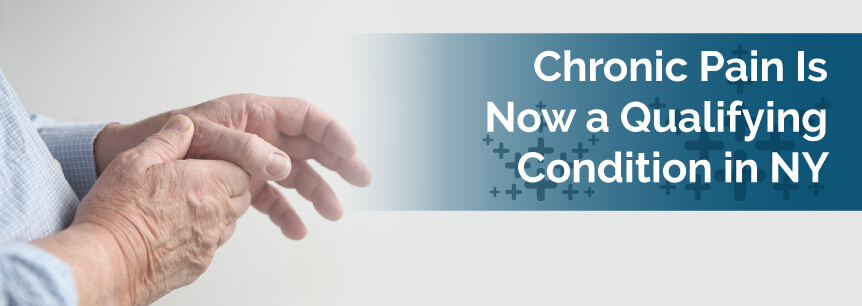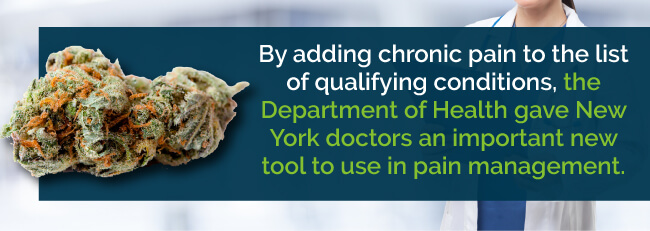
Good news! The New York State Department of Health now officially recognizes chronic pain as a qualifying condition for medical marijuana. The state previously included just ten conditions:
Under New York’s new provisions, if you find yourself experiencing chronic pain — even if it’s not associated with one of the above conditions — you’ll be able to obtain marijuana. But you’ll need to do so through a licensed healthcare professional.
In New York, doctors can recommend marijuana treatment after becoming certified marijuana doctors. They must be licensed physicians in good standing, must have completed a special course and must be registered with the Department of Health.
Patients who qualify for medical marijuana in New York benefit from professional, doctorly advice about the strains, types and forms of marijuana that will work best for them and their particular set of symptoms. Note that doctors can’t “write prescriptions” for cannabis because it’s a Federally controlled substance — instead, what they’re essentially doing is “recommending” it as your course of treatment.
With this recommendation in hand, you have access to medical marijuana from a safe, professional and licensed dispensary. Dispensaries sell all kinds of marijuana products, including some you may not have known about, like tinctures, teas and gummies. Naturally, these products are closely regulated for safety.
These strict guidelines make New York fairly average among states that have legalized medical pot. Marijuana is available only to people who suffer from the most severe symptoms that don’t respond to “traditional” treatments. Legal medical marijuana treatment used to be a last resort in the medical world — but after so many years of public pressure, it seems to be gaining much wider acceptance these days. Sadly, conservative-minded regulators at the Federal level have not kept up.
Early in 2017 — one year after New York’s program began — roughly 15,000 patients had been certified for medical marijuana treatment. That’s a good start, but there’s still work to be done. This number represents only a small fraction of the folks who could benefit from medicinal pot.
Still, 20% of the general population suffers from chronic pain, so adding it to the list of qualifying conditions opens up access to medical marijuana to New Yorkers who really need it. Many of them will see their physical and emotional well-being uplifted in a major way — to say nothing of their positivity, productivity and general outlook on life.
Pain management is now its own medical field. Why? Because when it goes untreated, pain itself develops into a preoccupying and potentially debilitating medical problem.
Keeping it at bay can be extremely difficult, which makes the development of opioid pain relievers easily the most significant innovation in pain management. Opioids block the kind of severe pain that was previously impossible to remedy with other medicines.
Unfortunately, we now know this type of drug is extremely addictive — and it’s fueling a national health crisis of epic (and tragic) proportions.
Becoming addicted to a medication you need every day doesn’t seem like a big problem at first, but the strength of an opioid addiction intensifies very quickly. Because of the way it influences the brain’s pleasure centers, an addiction to opioids can be extremely difficult to overcome, even with medical treatment. Fatal overdose is another constant worry. In addition to blocking pain, opioids depress some of the body’s vital functions.
Medical marijuana has been shown to reduce pain without these dangerous side-effects or the potential for misuse, abuse or overdose. Medical cannabis strains with the right THC and CBD balance can reduce even the most severe pain. Patients who suffer from chronic pain that was not controllable by conventional means can find relief with medical cannabis.

By adding chronic pain to the list of qualifying conditions, New York State gave doctors an important new tool for managing pain. Marijuana may even be effective in easing opioid addictions by relieving both pain and anxiety. Opioid pain relievers can be replaced by medical cannabis treatment and slowly phased out entirely.
Most significantly, medical cannabis could help us fight the rising number of opioid overdoses in this country. While medicating with marijuana, if a patient gets too much of the active ingredient, they may experience an uncomfortable sense of paranoia or mild hallucinations. But these are controllable conditions. There are no documented cases of death by marijuana overdose.
Obtaining a dispensary license in New York is not a brief or inexpensive process. But adding chronic pain to the list of qualifying conditions should bring about an uptick in the number of certified marijuana patients. And more patients mean more business. Colorado is a shining example of a brand-new industry that virtually sprang up overnight — and it’s bringing jobs, opportunity, tax revenue and economic stability to the state.
Could New York be the next Colorado? Hopefully — but they’ll need to spend more time speaking to residents who suffer from some of the conditions not currently approved for cannabis treatment.
If you’re wondering whether you qualify for medical marijuana in New York, use our first-of-its-kind NY marijuana doctor directory today. You’ll be able to find a registered, professional and thoroughly vetted doctor who can recommend the medicine you need.
No Information on MarijuanaDoctors.Com should be used to diagnose, treat, prevent or cure any disease or condition. You can view our Full Disclaimer here.